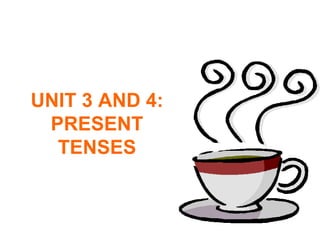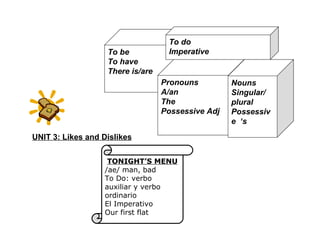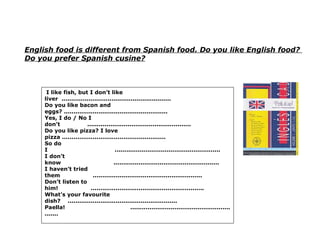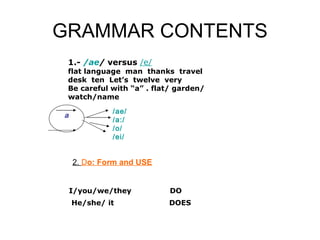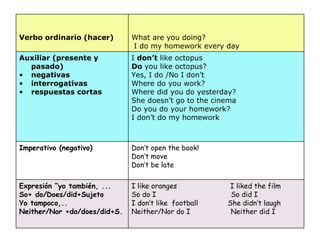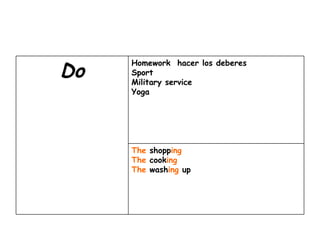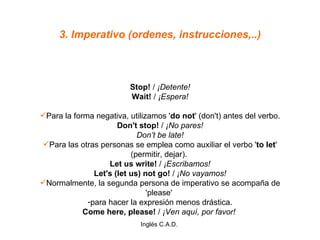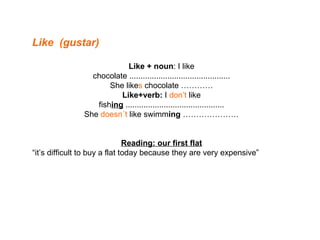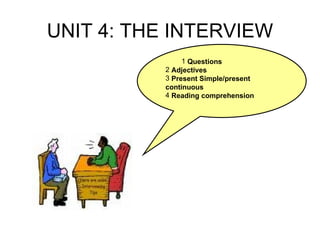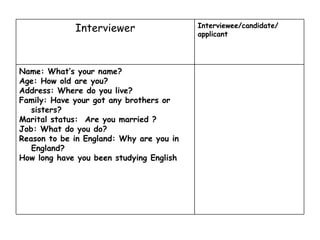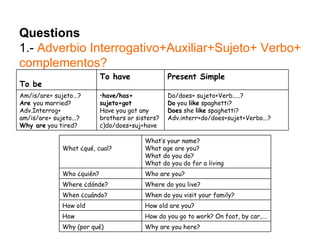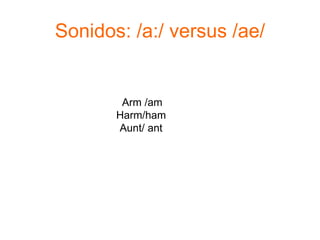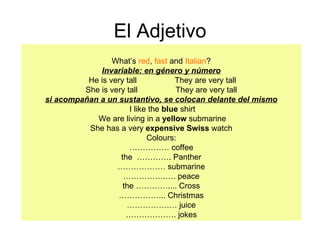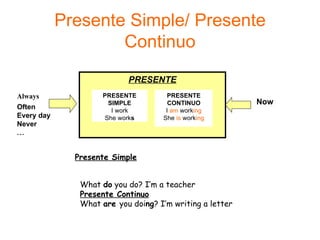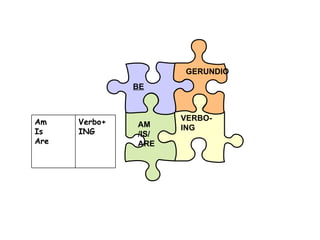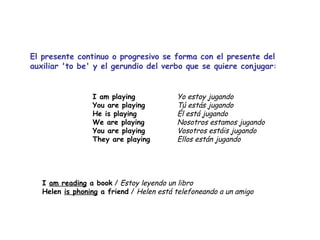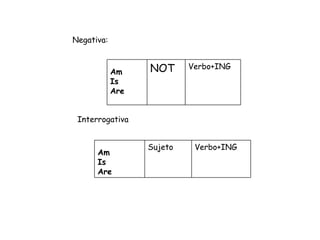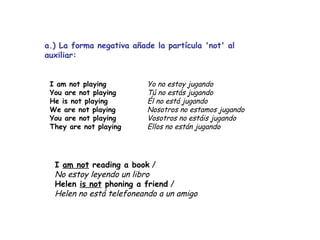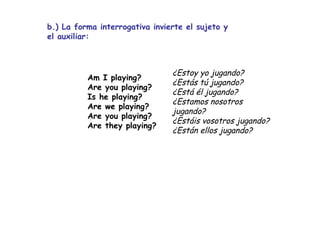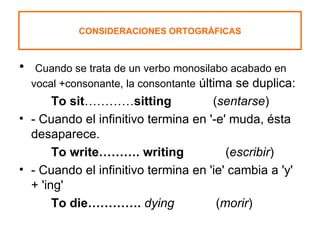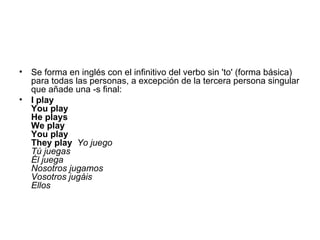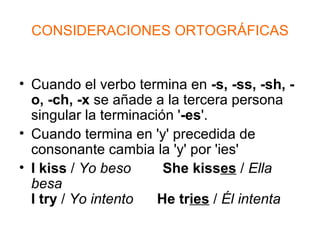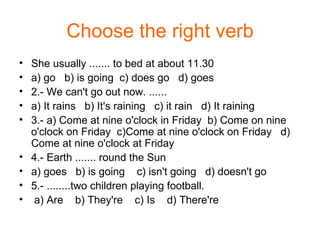Unit 3
- 1. UNIT 3 AND 4: PRESENT TENSES
- 2. To be To have There is/are Pronouns A/an The Possessive Adj To do Imperative Nouns Singular/ plural Possessive ŌĆśs UNIT 3: Likes and Dislikes TONIGHTŌĆÖS MENU /ae/ man, bad To Do: verbo auxiliar y verbo ordinario El Imperativo Our first flat
- 3. English food is different from Spanish food. Do you like English food? Do you prefer Spanish cusine? I like fish, but I donŌĆÖt like liver ......................................................... Do you like bacon and eggs? ...................................................... Yes, I do / No I donŌĆÖt ...................................................... Do you like pizza? I love pizza ...................................................... So do I ....................................................... I donŌĆÖt know ....................................................... I havenŌĆÖt tried them ......................................................... DonŌĆÖt listen to him! ........................................................... WhatŌĆÖs your favourite dish? ......................................................... Paella! ...........................................................
- 4. GRAMMAR CONTENTS a /ae/ /a:/ /o/ /ei/ 1.- /ae / versus /e/ flat language man thanks travel desk ten LetŌĆÖs twelve very Be careful with ŌĆ£aŌĆØ . flat/ garden/ watch/name 2. D o: Form and USE I/you/we/they DO He/she/ it DOES
- 5. I like oranges I liked the film So do I So did I I donŌĆÖt like football She didnŌĆÖt laugh Neither/Nor do I Neither did I Expresi├│n ŌĆ£yo tambi├®n, ... So+ do/Does/did+Sujeto Yo tampoco,.. Neither/Nor +do/does/did+S. DonŌĆÖt open the book! DonŌĆÖt move DonŌĆÖt be late Imperativo (negativo) I donŌĆÖt like octopus Do you like octopus? Yes, I do /No I donŌĆÖt Where do you work? Where did you do yesterday? She doesnŌĆÖt go to the cinema Do you do your homework? I donŌĆÖt do my homework Auxiliar (presente y pasado) negativas interrogativas respuestas cortas What are you doing? I do my homework every day Verbo ordinario (hacer)
- 6. The shopp ing The cook ing The wash ing up Homework hacer los deberes Sport Military service Yoga Do
- 7. 3. Imperativo (ordenes, instrucciones,..) Stop! / ┬ĪDetente! Wait! / ┬ĪEspera! Para la forma negativa, utilizamos ' do not ' (don't) antes del verbo. Don't stop! / ┬ĪNo pares! DonŌĆÖt be late! Para las otras personas se emplea como auxiliar el verbo ' to let ' (permitir, dejar).╠² Let us write! / ┬ĪEscribamos! Let's (let us) not go! / ┬ĪNo vayamos! Normalmente, la segunda persona de imperativo se acompa├▒a de 'please' para hacer la expresi├│n menos dr├Īstica. Come here, please! / ┬ĪVen aqu├Ł, por favor!╠²
- 8. Like (gustar) Like + noun : I like chocolate ............................................. She like s chocolate ŌĆ”ŌĆ”ŌĆ”ŌĆ” Like+verb: I donŌĆÖt like fish ing ............................................ She doesn┬┤t like swimm ing ŌĆ”ŌĆ”ŌĆ”ŌĆ”ŌĆ”ŌĆ”ŌĆ” Reading: our first flat ŌĆ£ itŌĆÖs difficult to buy a flat today because they are very expensiveŌĆØ
- 9. UNIT 4: THE INTERVIEW Questions Adjectives Present Simple/present continuous Reading comprehension
- 10. Name: WhatŌĆÖs your name? Age: How old are you? Address: Where do you live? Family: Have your got any brothers or sisters? Marital status: Are you married ? Job: What do you do? Reason to be in England: Why are you in England? How long have you been studying English Interviewee/candidate/ applicant Interviewer
- 11. Questions 1.- Adverbio Interrogativo+Auxiliar+Sujeto+ Verbo+ complementos? Do/does+ sujeto+Verb.....? Do you like spaghetti? Does she like spaghetti? Adv.interr+do/does+sujet+Verbo...? have/has+ sujeto+got Have you got any brothers or sisters? do/does+suj+have Am/is/are+ sujeto...? Are you married? Adv.Interrog+ am/is/are+ sujeto...? Why are you tired? Present Simple To have To be Why are you here? Why (por qu├®) How do you go to work? On foot, by car,ŌĆ”. How How old are you? How old When do you visit your family? When ┬┐cu├Īndo? Where do you live? Where ┬┐d├│nde? Who are you? Who ┬┐qui├®n? WhatŌĆÖs your name? What age are you? What do you do? What do you do for a living What ┬┐qu├®, cual?
- 12. Sonidos: /a:/ versus /ae/ Arm /am Harm/ham Aunt/ ant
- 13. El Adjetivo WhatŌĆÖs red , fast and Italian ? Invariable: en g├®nero y n├║mero He is very tall They are very tall She is very tall They are very tall si acompa├▒an a un sustantivo, se colocan delante del mismo I like the blue shirt We are living in a yellow submarine She has a very expensive Swiss watch Colours: ŌĆ”ŌĆ”ŌĆ”ŌĆ”ŌĆ” coffee the ŌĆ”ŌĆ”ŌĆ”ŌĆ”. Panther ŌĆ”ŌĆ”ŌĆ”ŌĆ”ŌĆ”ŌĆ” submarine ŌĆ”ŌĆ”ŌĆ”ŌĆ”ŌĆ” .ŌĆ”. peace the ŌĆ”ŌĆ”ŌĆ”ŌĆ”.... Cross ŌĆ”ŌĆ”ŌĆ”ŌĆ”ŌĆ” ... Christmas ŌĆ”ŌĆ”ŌĆ”ŌĆ”ŌĆ” .ŌĆ” juice ŌĆ”ŌĆ”ŌĆ”ŌĆ”ŌĆ”ŌĆ” . jokes
- 14. ╠²
- 15. Reading: Australia Cares for the environment
- 16. Presente Simple/ Presente Continuo PRESENTE PRESENTE SIMPLE I work She work s PRESENTE CONTINUO I am work ing She is work ing Always Often Every day Never ... Now Presente Simple What do you do? IŌĆÖm a teacher Presente Continuo What are you doi ng ? IŌĆÖm writing a letter
- 17. BE AM /IS/ ARE GERUNDIO VERBO-ING Verbo+ ING Am Is Are
- 18. El presente continuo o progresivo se forma con el presente del auxiliar 'to be' y el gerundio del verbo que se quiere conjugar : I am reading a book / Estoy leyendo un libro Helen is phoning a friend / Helen est├Ī telefoneando a un amigo Yo estoy jugando T├║ est├Īs jugando ├ēl est├Ī jugando Nosotros estamos jugando Vosotros est├Īis jugando Ellos est├Īn jugando I am playing You are playing He is playing We are playing You are playing They are playing╠²╠²
- 19. Negativa: Interrogativa Verbo+ING NOT Am Is Are Verbo+ING Sujeto Am Is Are
- 20. a.) La forma negativa a├▒ade la part├Łcula 'not' al auxiliar: I am not reading a book / No estoy leyendo un libro Helen is not phoning a friend / Helen no est├Ī telefoneando a un amigo Yo no estoy jugando T├║ no est├Īs jugando ├ēl no est├Ī jugando Nosotros no estamos jugando Vosotros no est├Īis jugando Ellos no est├Īn jugando I am not playing You are not playing He is not playing We are not playing You are not playing They are not playing╠²╠²
- 21. b.) La forma interrogativa invierte el sujeto y el auxiliar: ┬┐Estoy yo jugando? ┬┐Est├Īs t├║ jugando? ┬┐Est├Ī ├®l jugando? ┬┐Estamos nosotros jugando?╠² ┬┐Est├Īis vosotros jugando? ┬┐Est├Īn ellos jugando? Am I playing? Are you playing? Is he playing? Are we playing? Are you playing? Are they playing?╠²╠²
- 22. Cuando se trata de un verbo monosilabo acabado en vocal +consonante, la consontante ├║ltima se duplica: To sit ŌĆ”ŌĆ”ŌĆ”ŌĆ” sitting╠² ╠²╠²╠²╠²╠²╠²╠²╠²╠²╠² ( sentarse ) - Cuando el infinitivo termina en '-e' muda, ├®sta desaparece. To writeŌĆ”ŌĆ”ŌĆ”. writing ╠²╠²╠²╠²╠²╠²╠²╠²╠²╠²╠² ( escribir ) - Cuando el infinitivo termina en 'ie' cambia a 'y' + 'ing' To dieŌĆ”ŌĆ”ŌĆ”ŌĆ”. dying ╠²╠²╠²╠²╠²╠²╠²╠²╠²╠²╠² ( morir ) CONSIDERACIONES ORTOGR├üFICAS
- 23. Se forma en ingl├®s con el infinitivo del verbo sin 'to' (forma b├Īsica) para todas las personas, a excepci├│n de la tercera persona singular que a├▒ade una -s final: I play You play He plays We play You play They play╠²╠² Yo juego T├║ juegas ├ēl juega Nosotros jugamos Vosotros jug├Īis Ellos
- 24. CONSIDERACIONES ORTOGR├üFICAS Cuando el verbo termina en -s, -ss, -sh, -o, -ch, -x se a├▒ade a la tercera persona singular la terminaci├│n ' -es '. Cuando termina en 'y' precedida de consonante cambia la 'y' por 'ies' I kiss / Yo beso ╠²╠²╠²╠²╠²╠²╠² She kiss es / Ella besa I try / Yo intento ╠²╠²╠²╠²╠² He tr ies / ├ēl intenta
- 25. Choose the right verb She usually ....... to bed at about 11.30 a) go b) is going c) does go d) goes 2.- We can't go out now. ...... a) It rains b) It's raining c) it rain d) It raining 3.- a) Come at nine o'clock in Friday b) Come on nine o'clock on Friday c)Come at nine o'clock on Friday d) Come at nine o'clock at Friday 4.- Earth ....... round the Sun a) goes b) is going c) isn't going d) doesn't go 5.- ........two children playing football. a) Are b) They're c) Is d) There're
- 26. ╠²
